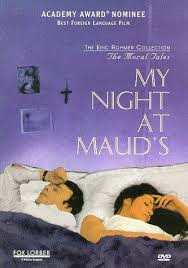
MY NIGHT AT MAUD'S (MA NUIT CHEZ MAUD).
France, 1969, 110 minutes, Black and White.
Jean- Louis Trintignant, Marie- Christine Barrault, Francoise Fabian.
Directed by Eric Rohmer.
My Night at Maud's is one of French director, Eric Rohmer's six moral fables. (These include Claire's Knee). Rohmer is a very literary director and a large part of his film consists of intellectual conversation and almost philosophical discussion. The hero is a conventional man, good and bad, a Catholic who wants to settle, find a good girl and marry. His night at Maud's is a confrontation of beliefs, the Catholic versus the freethinker and a resisting of erotic temptation. The irony of the film comes in the hero's marrying the former mistress of Maud's husband.Rohmer's films could be associated with those of Robert Bresson in their intellectual content and style and their design is that of contemporary morality plays. Of interest to those who have wide taste for the different styles of international cinema. (The film was nominated for an Oscar for the Best Foreign Film in 1970.)
1. Was this film too intellectual, too literary? or was it literate while using cinema language and technique effectively?
2. How typical was the hero? He came from a Catholic family, succeeded in business, had his affairs. his friends, was fairly devout and, at 34, wanted to settle and marry. Is he a hero that can be readily identified with?
3. What governed his choice of wife? blonde, Catholic? Was this a satisfactory basis for love and marriage?
4. What influence did his friend have on him? Communist, atheist puritan?
5. What did Maud stand for? good or evil? What did she believe in? what was the effect of a Catholic girl breaking up her marriage?
6. What was the importance of Pascal (thinker, puritan. scientist devout Catholic) in the discussion? What was the importance of his wager? acting as if God existed because this was the safer side of the risk?
7. Maud is shocked at Jean-Louis? why? What did she expect of him? Maud plays with him, tempts him. What governed his attitudes and behaviour towards her? How did this night of conversation affect him?
8. What did Francoise stand for? good or evil? Why did Jean- Louis marry her? Why did he let her believe that he had had an affair with Maud? What was the irony in the fact that Francoise had actually broken Maud's marriage?
9. What was the significance of the meeting with Maud five years later?
10. Eric Rohmer called this film a moral fable, of what?